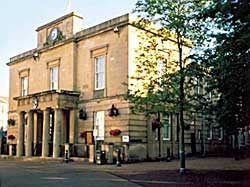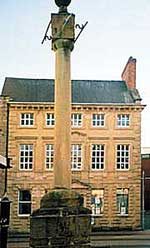

The Town Hall in the Market Place was built in 1836 (photo: Denis Hill).
Archival/written
Official
As well as a full set of Census Returns there is also an 1831 census for a large portion of the town giving substantial details. Although the town didn’t have its own Quarter Sessions until the twentieth century there are many references to the town within the County Quarter Session records including such things as Settlement Examinations, Removal Orders and Minute books; visit
web.ukonline.co.uk/lost-mansfield/lmmisc/qs16.htm for an index to references from 1603-42. Parish Registers date back to 1559. An extensive set of documents can be found within the Parish Chest including one of the most extensive sets of Settlement Certificates within the county, charitable records and deeds. Non-Conformist records offer documents dating back into the seventeenth century for Presbyterians and Quakers; visit web.ukonline.co.uk/lost-mansfield/lmmisc/quaker1.htm for an index to pre 1837 Mansfield Quaker records. The Manor of Mansfield had Power of Probate and consequently has a large set of wills, pre 1858, which can be found on microfilm in several locations. There is a collection of school records including logbooks and admission registers. Most of these records being located in the County Archives Office

Waverly House on Westgate dates from 1754 (photo: Denis Hill).
Personal
Since the Manor of Mansfield fell into the hands of both the Dukes of Portland & Newcastle their papers include many references to the town. These well-calendared and extensive collections can be found either in the Nottinghamshire Archive Office, a large portion of these calendars can be searched by using www.nationalarchives.gov.uk/a2a/, or www.nottingham.ac.uk/mss/. Several Mansfield families have been the subjects of biographical studies. The following: ‘Mary Bradbury, Mansfield 1891-1989 (Mansfield 1989)’, offers brief biographical sketches of many of the leading citizens of the town. See “A Nottinghamshire Bibliography: Publications on Nottinghamshire History Before 1998’ by Michael Brook” for a comprehensive list.
Administrative/business/economic
An extensive and well-indexed set of manorial records provide a good insight into many of the affairs of the town. Rate Assessment Books date back to the late eighteenth century. Between 1823 and 1891 an improvement Commission existed, leaving us with a good set of town administrative records, which are later supplemented by such committee minutes as the Sanitary Committee, School Attendance Committee, and later the Borough Council minute books. Water and gas Company Minutes also survive. Several local societies & charities, from the Victorian era onwards also provide records that offer a glimpse of both social and economic activity. Quarter Sessions also provided various administrative duties such as Land tax and Licences. The majority of these records being located within the County archives Office (many are indexed on www.nationalarchives.gov.uk/a2a/). The 1824 Improvement Commission Survey of the town provides an extensive census of both people and property.